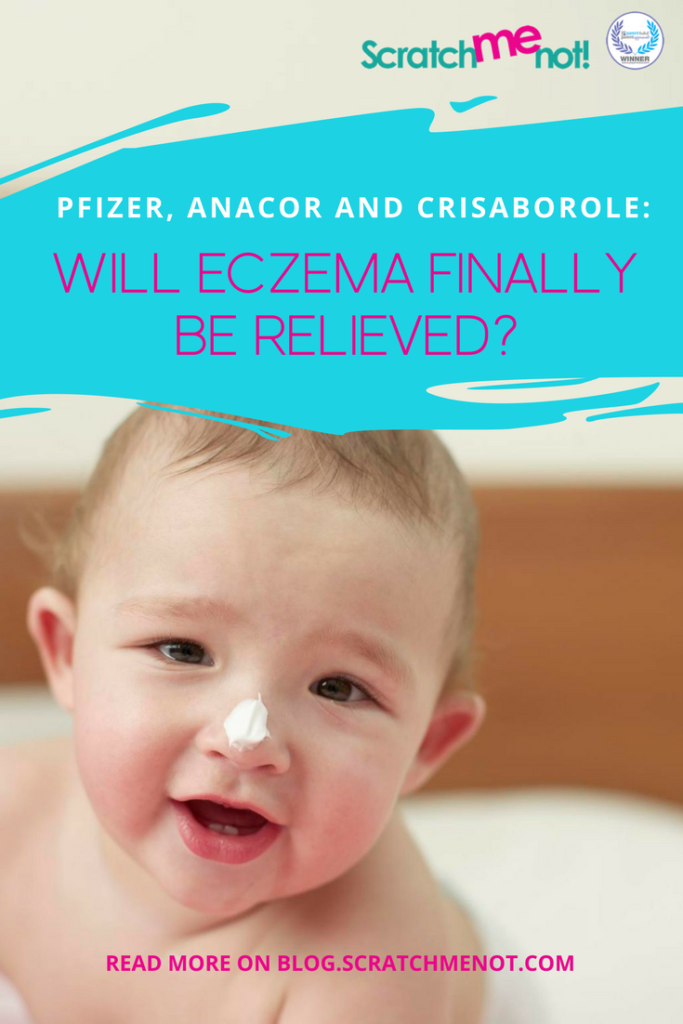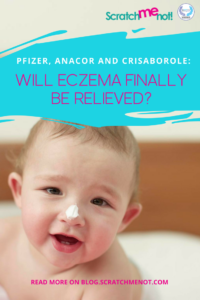Pfizer has recently acquired Anacor to secure the purchase and ownership of the medication – Crisaborole. Crisaborole 2% ointment is a non-steroidal topical medication that is geared towards mild to moderate eczema. Over the years, steroids has been one of the top prescribed medications for eczema. However, the long term side effects of steroid use, include skin thinning, HPA axis suppression & topical steroid withdrawal. There’s a lot of hope pending in this FDA approval, as this will be the first medication approved for eczema in 15 years.
There’s two sides of this merger, I’d like you to consider.
Facts
There were two double blind vehicle controlled investigations conducted.
Patients with mild-to-moderate Atopic Dermatitis (AD), aged 2 years and older, were randomly given Crisaborole or the vehicle twice daily. Participants were evaluated on days 8, 15, 22, and 29. Study 1 consisted of 503 Crisaborole and 256 vehicle patients, while study 2 comprised of 513 Crisaborole and 250 vehicle patients.
On day 29 of the study, a greater amount of participants treated with crisaborole attained Investigator’s Static Global Assessment (ISGA) success (Study 1: 32.8% vs. 25.4%; Study 2: 31.4% vs. 18.0%). In addition, more Crisaborole-treated patients reported their eczema as “clear” or “almost clear” (study 1: 51.7% vs 40.6%; study 2: 48.5% vs 29.7%).
Food allegories and eczema have increased tremendously over the years. More recently, doctors and parents alike, are finding that many times eczema is a sign of something that needs to be adjusted or treated internally or removed externally. For internal concerns, the body is rejecting a type of food, showing signs of leaky gut, or other allergies/sensitivities. External, the body is rejecting an item it’s coming into contact with, detergents, synthetic materials, pollen, etc.
Side Effects
The most common side effects of Crisaborole were pain in the application site and infections in the upper respiratory tract. Serious adverse events were also not reported in patients given Crisaborole.
A long-term safety study is being conducted to further evaluate safety in intermittent use of the medication for up to a year. A minimum of 100 and 300 patients part of the Phase 3 studies are also participating in this study, enrolled for 12 and 6 months respectively. Results should be made available at the end of the year, according to Anacor. Since this medication is so new, long term effects beyond a year have not been measured or released. More research to come.
What’s my take?
When my daughter was first diagnosed with eczema, I loved having a steroid that healed her skin, but I began to notice her eczema was getting worse and worse. Her skin would need a higher does of steroids as time went by. I began to question side effects and what was causing eczema within her body. While I’m grateful for the relief that medication provided, it was necessary for me to unravel the source. For us, it was food allergies. Yet, some children’s eczema is extra stubborn and sometimes there’s a need for medication. I hate to be anti-medicine and I’m not, but I made a conscious decision to figure out what caused my child’s eczema and focus on the understanding, healing and relieving the source. It was not an easy road, but it proved to help long term as I’ve had other children since then with varying degrees of eczema that I’ve been able to apply this same principle. Now with experience to solve their eczema.
Conclusion
This is wonderful news. Better drugs will be available that are safer than steroids. It gives children and adults an effective option. While Crisaborole is geared to help mild to moderate eczema, it can in a sense, heal the symptom (signal) and help us ignore the underlying causes all together.
If Anacor’s medication was geared towards severe eczema or cases where parents or adults were unable to figure out the root cause, and these same patients are now using auto inhibitors and a host of other strong medications that have terrible side effects, I think I’d be more amped and excited for this merger. A new safer drug passed to help those patients would be a major step forward.
I’m wondering if Pfizer acquired Anacor to heal mild to moderate eczema to make a crazy amount of money, knowing that the underlying source won’t be addressed. Maybe I’m reading into it too far.
The truth is, we all want itchy skin/eczema relief for both ourselves and definitely for our children. We don’t want to see our kids suffer any longer than they have to. I am no where near anti-medication, just cautious of the type of medications used. Perhaps this is a wonderful step forward to getting a stronger medication approved for severe eczema. Yet, it leaves me pondering… maybe large corporations should spend time determining why food allergies and eczema has spiked and how to eliminate those triggers rather than a cream. Perhaps publishing pesticides and their effects on our food chain and health.
Resources: TechTimes


